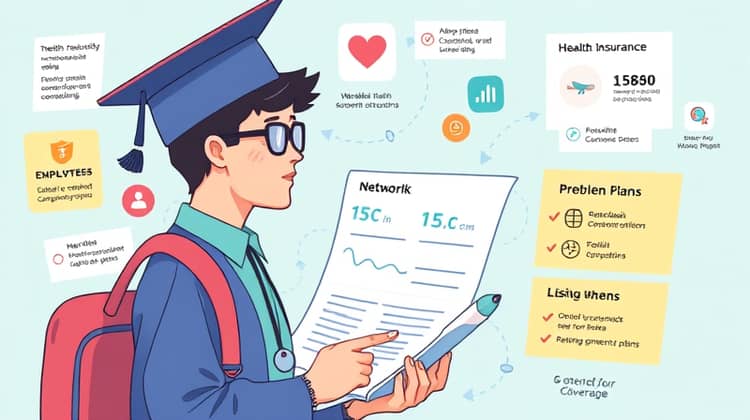Graduating from college is a monumental achievement, but it also marks the beginning of a new chapter filled with responsibilities that go beyond just finding a job. Entering the workforce often brings significant changes to your financial landscape. The decisions made right after graduation can lay the groundwork for a secure and prosperous future.
Financial planning is crucial during this transitional period. It encompasses understanding your income, managing expenses, handling debt, and investing for the future. This guide offers practical steps to navigate the post-graduation financial waters, from budgeting to building an emergency fund and making investment choices.
The aim is to empower recent graduates with the knowledge and tools needed to take control of their finances. By following these guidelines, individuals can make informed decisions that contribute to long-term stability and growth. Let's explore these concepts further.
Financial Planning After Graduation

As graduation approaches, many new graduates find themselves in a state of uncertainty regarding their financial futures. It's essential to have a solid financial plan that addresses short-term and long-term needs. This section outlines crucial steps for effective financial planning post-graduation, highlighting the importance of taking immediate action to secure financial well-being.
The first step in establishing a financial plan is to understand your financial landscape. This includes knowing your income sources, expected expenses, and outstanding debts. Awareness is critical, as it informs your decisions and the strategies you opt for in managing your finances.
Lastly, developing a financial plan doesn't have to be overwhelming. By approaching financial planning step by step, graduates can break down their goals into manageable actions. With the right framework, it's possible to navigate this new phase confidently. Let's delve deeper into understanding your financial situation.
Understanding Your Financial Situation

Before you can create a detailed financial plan, it's essential to understand your current financial situation. This means assessing your income, expenses, and debts. Graduating college often means entering the workforce for the first time, which may lead to a steady income but could also come with considerable student debt. Evaluating your financial landscape allows you to see where you stand and what steps you need to take to move forward.
- Determine your monthly income from your job or any side hustles.
- List your monthly expenses, including rent, utilities, groceries, and entertainment.
- Identify any student loans, credit card debts, or other financial obligations.
This analysis provides a foundation to help you formulate your budget and financial priorities. By knowing where you stand, you can begin to make informed decisions about spending, saving, and investing. After gaining this understanding, the next step is to create a budget that aligns with your financial goals.
Creating a Budget

Creating a budget is a crucial step for new graduates. It helps manage income effectively and ensures that expenditures do not exceed earnings. A well-structured budget will allow you to allocate funds for various categories, which can mitigate the risk of overspending and foster disciplined financial habits.
A budget serves as a roadmap for your financial journey. It provides clarity on how much money is coming in and where it is being spent. Establishing this practice early on can significantly contribute to better financial management as you navigate new responsibilities. Here are the key elements to include in your budget.
- Track your income from all sources.
- Categorize your monthly spending into needs and wants.
- Set savings goals and allocate a portion of your income toward these goals.
- Adjust your budget as needed to reflect changes in income or expense.
With a functional budget in place, you'll be able to manage your finances more effectively, prioritize savings, and reduce unnecessary debt. Be sure to review and adjust your budget regularly to ensure it stays relevant to your changing financial circumstances. Moving forward, managing any student loans will be one of the most pressing concerns graduates face.
Managing Student Loans

For many graduates, student loans represent a significant financial burden. Understanding your loans is crucial for effective management. This involves knowing how much you owe, the interest rates, and the repayment terms. The earlier you start tackling your loans, the better off you'll be in the long run.
It's also important to explore various repayment options. Some loans may offer deferment or income-driven repayment plans that can ease the financial pressure during the initial years after graduation. Here are some key strategies to consider when managing your student loans.
- Know the type of student loans you have and the interest rates attached to them.
- Explore options for loan forgiveness or repayment assistance programs.
- Consider making extra payments when possible to reduce the principal amount.
Being proactive with your loans can greatly lessen long-term financial strain. With mindful management, you can set the stage for a more secure financial future. Next, let's discuss the importance of building an emergency fund.
Building an Emergency Fund

An emergency fund is a safety net that provides you with financial security in case of unexpected expenses or loss of income. Establishing this fund early in your career can protect you from financial stress and unplanned debt. The standard recommendation is to save three to six months' worth of living expenses in an easily accessible account.
Building an emergency fund doesn't have to happen overnight; it's a gradual process. Save a small amount each month, and over time, you'll create a cushion that can alleviate the financial burden of unforeseen circumstances. Here are steps to successfully establish your emergency fund.
- Set a monthly savings goal that is realistic for your budget.
- Open a dedicated savings account for your emergency fund.
- Automate your savings to ensure consistency and avoid the temptation to spend.
With a reliable emergency fund, you can tackle unexpected events without falling into debt. It is integral to your overall financial health and provides peace of mind during financial uncertainties. The next step is considering various investment opportunities for long-term financial growth.
Investing for the Future

Investing is one of the smartest ways to grow your wealth over time. It’s essential for new graduates to start thinking about how their money can work for them. The earlier you begin investing, the more you can take advantage of compound interest, which can significantly increase your returns over the years. There are various options available to consider in your investment strategy.
However, before diving into investment, you should first educate yourself about the various types of investments available. Diversifying your investments will spread risk and can yield better returns. Here are some investment options graduates can explore.
- Stocks - shares in a company that can provide dividends and appreciation over time.
- Bonds - loans to government or corporations that pay interest over time.
- Mutual Funds - pooled investments in a diversified portfolio managed by an investment company.
- Retirement Accounts - tax-advantaged savings plans like 401(k)s or IRAs.
Investing is a powerful tool that can help secure your financial future. By starting early, even with small amounts, you can build a substantial nest egg over time. The next area of focus is understanding the different types of insurance available to protect your financial well-being.
Understanding Insurance

Insurance is a key component of financial planning that is often overlooked by new graduates. As you embark on your professional journey, it's essential to understand the various types of insurance available to protect your financial future. From health insurance to renter's insurance, having adequate coverage is crucial in safeguarding your assets and health.
Understanding your insurance options will enable you to make informed decisions. This section highlights the critical types of insurance to consider as you transition into independent living and employment.
Having the right insurance coverage not only protects you from financial ruin in case of emergencies but can also provide peace of mind, allowing you to focus on your career and future goals.
Protecting Your Well-being

When it comes to financial planning, protecting your well-being should be a top priority. Proper insurance safeguards you from significant financial loss in the face of unexpected events. The peace of mind that comes with reliable coverage allows you to live your life confidently and focus on both personal and professional growth.
Consider the following types of insurance that can help protect your well-being as a new graduate entering the workforce.
- Health Insurance - to cover medical expenses and emergencies.
- Renter's Insurance - to protect personal belongings and liability.
- Disability Insurance - to replace income in case of injury or illness.
Understanding and acquiring the right insurance can be seen as an investment in your future well-being. Make sure to review your plans and coverages regularly, as your lifestyle and needs may change over time. The following section addresses an important aspect of your health coverage - how to navigate health insurance.
Navigating Health Insurance

Health insurance can be a daunting subject for new graduates. Many employers offer health plans, but understanding what's available and how to choose the right plan for your needs is crucial. Familiarize yourself with health insurance terminology, network plans, and deductibles to make informed choices about your health coverage.
Evaluate your health care needs and any potential coverage options offered through your employer. Knowing the pros and cons of each plan can help you choose one that fits both your health needs and your budget.
- Review the coverage options provided by your employer carefully.
- Consider whether you need additional coverage for specialized medical care.
- Understand deductibles, copays, and the out-of-pocket maximums.
Selecting the right health insurance plan can protect you from sudden high medical expenses and allow you to seek care when necessary. It's worth taking the time to understand your options thoroughly and choose a plan that aligns with your health and financial conditions. Now, let's tackle the subject of pursuing additional education and its relation to your financial future.
Pursuing Additional Education

Many graduates consider continuing their education to enhance their knowledge and skills, which can lead to better job prospects and higher earnings. Deciding whether to pursue further education is a significant consideration that requires careful evaluation of costs versus benefits. Pursuing advanced degrees or certifications can yield a high return on investment if aligned with your career goals.
However, additional education often comes with its own financial burdens. It's essential to weigh the potential increase in income against the costs associated with advanced studies. Evaluate whether now is the right time to invest in further education or if gaining work experience first might be more beneficial.
Continuing Education as an Investment

Continuing education is often viewed as an investment in one's future. Many industries change rapidly, so keeping up with new developments can be crucial for success. Graduates should consider the long-term advantages of additional education as they plan their finances.
Investing time and money in degrees and certifications can position you ahead of others in a competitive job market, ultimately leading to more significant earnings. Continuous learning also showcases dedication and ambition, traits desirable to potential employers.
Seeking Financial Advice

As you navigate post-graduation financial planning, seeking financial advice can be pivotal in making informed decisions. No one has to manage their finances alone; consulting with a financial advisor can help graduates develop a personalized plan tailored to their unique goals and circumstances.
Advisors can provide valuable insights on budgeting, investing, and retirement planning, supporting you in developing a holistic financial strategy. There are various options for seeking financial advice, including one-on-one consultations, workshops, and online resources.
Conclusion

In conclusion, financial planning after graduation is an essential steps toward achieving long-term stability. By understanding your financial situation, creating a well-structured budget, and managing debts wisely, you set the groundwork for a successful financial future.
Additionally, building an emergency fund, investing wisely, and understanding insurance encompass key components of a sound financial strategy. Each of these areas requires attention and strategic planning to ensure security and growth in your financial life.
As you embark on this new chapter, use the resources available to you, pursue knowledge, and don't hesitate to seek help. Remember, taking control of your finances is a gradual journey but can lead to greater peace of mind and financial security.














